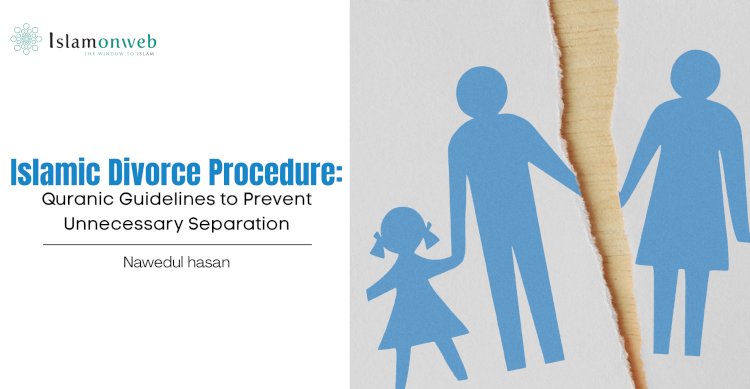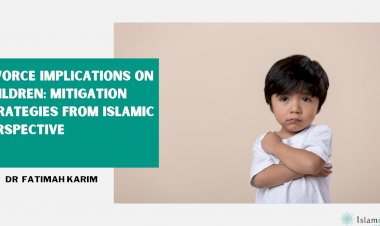Islamic Divorce Procedure: Quranic Guidelines to Prevent Unnecessary Separation
Islam is a traditional and systematic way of life that encompasses consolation, compassion, counselling, guidance, and instructions for a better way of living in the light of the Quran and Hadith. The religion of Islam, for the sake of tranquillity, harmony, and the well-being of the human body, promotes marriage as a means of continuous growth, reproduction, and propagation. At the same time, it also introduces the concept of divorce to prevent unnecessary difficulties and conflicts when differences become irreconcilable.
When the possibility of living together in harmony comes to an end, leading to a life of suffocation and misery, Islam provides divorce as a solution. As a religion of peace and tranquillity, Islam encourages its followers to focus on building relationships and strengthening family ties rather than severing them. While allowing for divorce, Islam also lays down fundamental principles to discourage its misuse. When these principles are followed, the incidence of divorce in society is significantly reduced.
A Muslim should follow the basic instructions of Prophet Muhammad (ﷺ) when choosing a life partner in order to have a lasting and peaceful life. The Prophet (ﷺ) said, ‘A woman is married for four reasons: for her wealth, for her lineage, for her beauty, or for her piety. Choose the pious one, and you will be blessed.’ Similarly, the Prophet (ﷺ) also stated, ‘When someone whose religion and character you are pleased with proposes to (a woman under your care), then marry her to him. If you do not do so, there will be turmoil (*fitnah*) in the land and widespread discord (Fasad).’
The aforementioned Hadiths encourage marrying a woman of faith, good character, and moral integrity. If these qualities are prioritized in marriage, then by the grace of Allah, marital life will be peaceful. A religiously committed woman will always be obedient and loyal to her husband. Moreover, the thought of seeking a divorce will not even cross her mind. Even if such thoughts arise, the following words of the Prophet (ﷺ) should be enough to dissuade her from such an action. The Prophet (ﷺ) said, ‘Whichever woman seeks Khula’ from her husband without a valid reason, the fragrance of Paradise will be forbidden for her.’
Similarly, a husband should not resort to divorce without necessity. If such thoughts of divorce cross his mind, the following words of the Prophet (ﷺ) should be enough to admonish a devoted husband. The Messenger of Allah (ﷺ) said, ‘The most detestable of permissible things to Allah is divorce. Nevertheless, if disagreements arise after marriage and a husband finds certain habits or traits of his wife unpleasant, instantly deciding on divorce is not a sign of wisdom. It is possible that, despite some discourteous behaviour or undesirable traits, she possesses greater virtues and positive qualities. In such cases, resorting to divorce may lead to regret and remorse. The Quran advises in such situations: ‘Treat them fairly. If you happen to dislike them, you may hate something which Allah turns into a great blessing.
However, if a wife’s disobedience reaches a level where continuing marital life becomes arduous and difficult, and you firmly decide on divorce, then take a moment to reflect on the guidance of the Quran—perhaps the situation may improve. The Holy Quran states: ‘But those [wives] from whom you fear arrogance – [first] advise them; [then if they persist], forsake them in bed; and [finally], strike them [lightly].’
The verse outlines three steps to guide a disobedient wife back to the right path.
- Advice and Admonition: First, try reasoning with her by highlighting the benefits of obedience and the consequences of disobedience. Instil in her the fear of Allah and remind her of the punishments of the Hereafter. If her heart is filled with the fear of Allah and the love of the Prophet ﷺ, this initial step may be enough to restore harmony.
- Separation of Bed: If advice does not bring results, take the second step: separation of bed. If she has even a little love and affection for her husband, this action may compel her to accept obedience. After all, for a devoted wife, it is deeply distressing when her husband, despite being physically present, distances himself and turns away from her.
- Light Physical Discipline: If the previous steps fail, the third step is to administer light physical reprimand (a mild beating). But what should this discipline look like? The Quranic commentary explains:
This form of discipline involves giving one or two light strikes on the body (excluding the face and vulnerable organs) with the hand or an object like a Miswak (small tooth-stick). It does not include the harsh and ignorant forms of beating common among illiterate people, where they target the face and entire body, use fists, kicks, or clubs, and strike with a stick or whatever comes to hand, leaving the woman bruised and bleeding. Such actions are completely forbidden, unlawful, a grave sin, and an extreme act of ignorance and disgrace.
However, if despite applying all three methods, the wife’s stubbornness and defiance persist, exercise a little more patience and additionally follow the guidance of the Quran:
‘And if you fear dissension between the two, send an arbitrator from his people and an arbitrator from her people. If they both desire reconciliation, Allah will cause it between them. Indeed, Allah is ever Knowing and Acquainted [with all things].’
When all internal efforts at reconciliation fail, the husband and wife should each appoint an adjudicator from their respective families or communities. These adjudicators should listen to both sides and focus solely on resolving their disagreements to foster reconciliation. If both firmly place their trust in Allah, harmony and love can be restored between them. Following these instructions can help prevent the need for divorce.
If all attempts at reconciliation fail, hope fades from every direction, and no possibility remains for a peaceful and loving life together, then Islam does not compel spouses to endure a distressing and suffocating relationship. Instead, Islam provides the concept of divorce as a solution to such situations. This ensures that neither the husband nor the wife falls into despair or resorts to self-harm or suicide due to their marital struggles—tragedies that too often make headlines. In such cases, it is better for the husband to grant a divorce, allowing both individuals to live independently or remarry, bringing peace and contentment into their lives.
It Is also important to note that divorce should not be given during a woman’s menstrual period, as this is a time when natural affection and physical desire may be diminished. Likewise, divorce should not be issued during a state of purity (Tuhr) if intimacy has already taken place, as physical relations may temporarily lessen a husband’s inclination toward his wife. Instead, it should only be issued during a period of purity in which no marital relations have transpired, ensuring that the decision is made out of necessity rather than impulsive aversion or frustration.
Moreover, only a single revocable divorce (Talaq Raj’i) should be given, as Allah Almighty states: ‘O man, you do not know that Allah may perhaps develop a new situation (to turn you back to her after divorce).
The above verse advocates for a revocable divorce because it allows room for reconciliation. It is possible that after issuing the divorce, the husband may realize his mistakes and rekindle his affection and desire for his wife. If both spouses wish to reunite and continue their marital life, having given only one revocable divorce ensures that, from a legal perspective, the husband retains the right to return to the previous situation—without the need for a new marriage contract—simply through words or actions indicating reconciliation.
Even if the Iddah (waiting period) has ended, the possibility of reconsideration remains open through a new Nikah (marriage contract). If, after reunion or remarriage, the relationship still does not improve and the husband is forced to issue a second divorce, the opportunity to reunite remains according to the prescribed guidelines of Islam. They still have the option to resume their marital life as husband and wife through the same process of reconciliation.
However, if the husband issues a third divorce, the couple becomes permanently prohibited (haram) for each other. Even remarriage will not make their union lawful again. If unrestricted divorce and reconciliation were permitted indefinitely, then, just like in the pre-Islamic era, a husband could divorce and remarry repeatedly. This would reduce women to being at the mercy of their husband’s whims.
To prevent such injustice, Islam has set clear boundaries: a husband may reconcile only twice. However, if he issues a third divorce, an irrevocable prohibition takes effect, making the woman permanently unlawful for him. However, after an irrevocable divorce, if a woman seeks a life partner, she is free to marry any other eligible man (except her former husband). If she marries a second man, they can live together for as long as they wish with mutual consent.
However, if the second husband decides to divorce her for any reason, she still has the right to marry a third husband under Islamic law. In this case, she may also remarry her first husband, as she becomes lawful (Ḥalāl) for him after her second marriage, provided that the marriage was consummated and she has completed her ʿIddah (waiting period).
Unfortunately, some ignorant anti-Islamic extremists have misinterpreted this concept as a form of oppression against women. In reality, Islam upholds justice and fairness for both men and women, restricting oppression and injustice. Under Islamic guidance, all human beings—whether rich or poor, young or old, of any race or gender—are equal.
About the author
Nawedul hasan, Sitamarhi, Bihar, is a second-year student of the Dept. of Quran and related Sciences in UG campus at Darul Huda Islamic University, Chemmad, Kerala.
Bibliography
- Azmi, Altaf Ahmad. Divorce in Islam: An Islamic Perspective. Al-Balagh Publications, 2017.
- Maudoodi, Syed Abul ʻAla. The Laws of Marriage and Divorce in Islam. Islamic Books Publications, 1990.
- Danyal, Kahkashan. Muslim Law of Marriage, Dower, Divorce and Maintenance. Regal Publications, 2015.
- Misbahi, Muhammad Sabir Raza. Islam ka Nizame Talaq. Urdu Edition. Khawaja Book Depot, 2023.
- Lemons, Katherine. Divorcing the Secular: Islamic Marriage Law and the Making of Indian Secularism. Cornell University Press, 2019.
- Muslim, Sahih. “Book of Divorce (Kitab Al-Talaq).” In Sahih Muslim.
Disclaimer
The views expressed in this article are the author’s own and do not necessarily mirror Islamonweb’s editorial stance.
























Leave A Comment